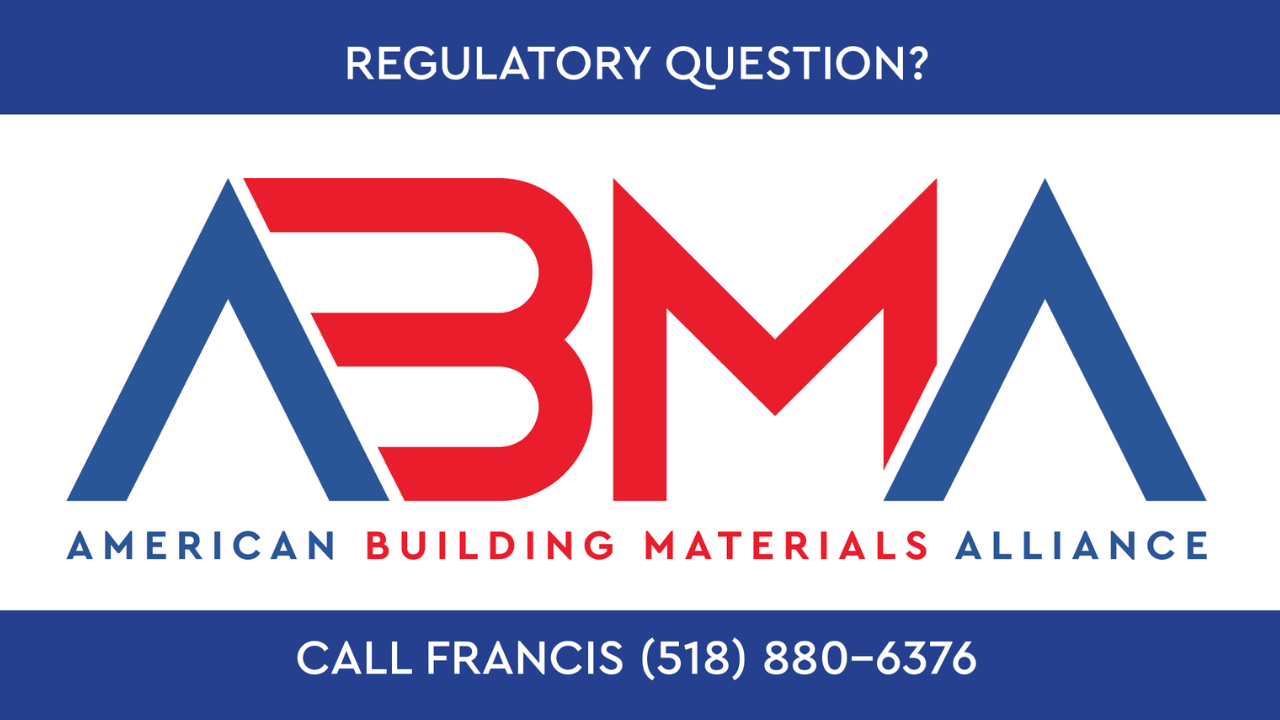In the Field
Francis Palasieski, ABMA’s Director of Government Affairs.
When Members Show Up, Things Happen
It takes people to build something that lasts. In our case, it’s not just buildings—it’s the regulatory changes the LBM industry needs to survive and grow.
The businesses ABMA represents are mostly small, independently owned, and often family-run. These aren’t sprawling corporations with layers of backup. They’re operations where, if the delivery driver calls in sick, the owner grabs the keys and gets behind the wheel. They’re the kind of businesses that keep showing up and finding a way even when the system doesn’t make it easy.
But large, sweeping, one-size-fits-all regulations aren’t built for them. They create a sandbox where only the biggest players can afford to stay in the game.
That’s why member involvement matters. When our members speak up and bring real-world perspective to the table, we don’t just get heard, we get results.
Take the recent CDL training issue. Just days after ABMA members Rod Wiles and Eric Murphy participated in a roundtable with the U.S. Small Business Administration, the SBA submitted formal comments to the U.S. Department of Transportation dedicating an entire section to the CDL training concerns our members raised. That didn’t happen because someone sent a memo. It happened because members built the relationship, showed up with practical experience, and offered solutions that made sense.
The same goes for the Advanced Clean Trucks (ACT) rule. As written, this rule effectively freezes the sale of work trucks in many states. It demands a transition to electric vehicles that aren’t yet widely available and certainly not in the configurations our industry relies on. It’s a regulation disconnected from reality, and the consequences are already being felt across the LBM industry.
But again, members led the charge. In New York, members ran op-eds in six local papers. In Massachusetts, Tony Shepley wrote directly to the Governor. In Vermont, Jeremy Baker is working closely with the Lt. Governor. In New Jersey, TJ Shaheen has been running back-to-back-to-back yard tours gaining bipartisan support from lawmakers who now understand what’s at stake.
ABMA pulled these efforts together and brought them to Washington. The result? The U.S. House has already voted to roll back the ACT rule, and the Senate has committed to act before the end of June.
The Three-Part Strategy That Works
There’s no secret to how we operate but there is a formula:
- Member Action – It starts on the ground. Members flag the problems and explain how they play out in real life.
- Targeted Lobbying – We translate those stories into policy solutions and bring them straight to the people making the decisions.
- Smart Communication – We shape the message, build public support, and keep the pressure on where it counts.
Regulatory reform isn’t just talk—it’s happening. At the recent roundtable, Bruce Lundegren, Assistant Chief Counsel at the SBA’s Office of Advocacy, called this a once-in-a-generation opportunity. He’s right. The window is open.
So don’t let it slip by. If there’s a rule that’s holding your business back, now’s the time. It’s as easy as picking up the phone or writing an email. Tell us the change you need—ABMA is here to help make it happen.
Call Francis at 518-880-6376.
On the Hill
Jim Thompson & Team, ABMA Government Relations
ABMA Scores Wins on Small Business Tax Relief
A tax package nicknamed the “Big, Beautiful Bill” is moving through Congress with several important provisions that could benefit independent retail lumber and building material dealers. Extending these tax breaks has been an ABMA priority since our founding, and we’re encouraged to see progress toward legislation that supports the growth and sustainability of small and medium-sized businesses in our industry.
These developments aren’t happening in a vacuum—members raised these very priorities directly with their congressional offices during ABMA Advocacy Day, sharing firsthand how current tax rules impact their ability to grow, hire, and reinvest. When members speak, lawmakers listen, and these wins are proof.
Extension of 2017 Tax Cuts
The bill includes an extension of key parts of the 2017 Tax Cuts and Jobs Act (TCJA), including a lower corporate tax rate and pass-through business deductions. For example, if you operate as an S corporation or LLC, the bill preserves your eligibility for the 20% deduction on qualified business income—savings that can help offset rising costs for materials, equipment, or payroll.
Immediate Expensing for R&D Costs
The bill restores the ability to fully deduct research and development (R&D) expenses in the year they’re incurred. For LBM businesses, this could apply to investments in proprietary software systems, inventory tracking upgrades, or in-house product development efforts—areas where innovation drives efficiency and competitiveness.
100% Bonus Depreciation for Equipment
This provision allows dealers to immediately write off the entire cost of qualifying equipment purchases—such as delivery trucks, forklifts, saws, and other machinery—rather than depreciating them over several years. That improves cash flow and can make it more feasible to invest in tools that increase productivity and customer service capacity.
More Flexible Business Interest Deductions
The bill loosens current limits on how much interest businesses can deduct on loans. This is especially helpful for companies that recently financed a new location, warehouse expansion, or fleet upgrades—common investments across the building supply industry.
Permanent Small Business Deduction
The 20% small business deduction—critical for many independently owned LBM dealers—is made permanent under the bill. This ensures ongoing tax relief for companies structured as pass-through entities and reinforces the long-term stability of small businesses in our sector.
Tax Breaks for U.S.-Manufactured Products
A reduced corporate tax rate for goods produced in the United States aims to encourage domestic manufacturing. This may provide downstream benefits for dealers who source from U.S.-based millwork shops, truss manufacturers, and component suppliers.Bottom of Form




